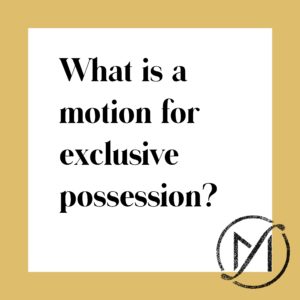What is a Motion for Exclusive Possession?

The “Motion for Exclusive Possession of the Marital Residence” is fairly common in Connecticut divorces. Connecticut courts have the authority to award exclusive use of the family home to either of the spouses during the divorce. This motion does not ask the court to decide who will get the home when property is divided. Rather, the court only decides whether one party will have exclusive use of the house pendente lite (during the divorce).
Read on to learn more.
Family Home & Automatic Orders
The automatic orders are explained in Connecticut Practice Book §25-5. These orders automatically go into effect at the beginning of a divorce, legal separation, or custody action. The goal of the automatic orders is to keep the “status quo” in place as much as possible during the divorce. Among many other things, they address who will live in the family home during the divorce.
- Neither spouse may deny the other use of the family home without a court order if the spouses are living together on the date the court papers are delivered.
The Motion for Exclusive Possession is the mechanism for a spouse to seek a court order to live in the home without the other spouse. If the court rules that one spouse has exclusive possession, that court order trumps the “default” of the automatic orders.
When Can You File a Motion for Exclusive Possession?
You can file a motion for exclusive possession — also called a Motion for Exclusive Use — at any time following the filing of a divorce or custody action.
This motion does not ask the court to decide who will get the home following the divorce. Importantly, it doesn’t matter which spouse owns the house. The court may award exclusive possession to either spouse regardless.
Does it Matter Which Party Has Title to the House?
No. A court may award exclusive occupancy regardless of whose name the home is titled in. In fact, ownership of a home is not necessary, and a court may order exclusive use of rental properties as well.
When Will a Court Grant a Motion for Exclusive Possession?
A Motion for Exclusive Possession must state “the grounds upon which the moving party seeks exclusive possession.”
A spouse’s reason for the request must more compelling than the fact that the spouses are not getting along. For example, the court would consider evidence of the following — especially in the presence of children — significant:
- physical abuse
- substance abuse
Courts are reluctant to make spouses’ pay for two households if they cannot afford to do so. However, when cohabitation is dangerous, courts will grant the motion anyway.
Next Steps
For more information about Connecticut divorce and family law, check out our Divorce Information and Facts. If you have questions or want to learn more about how our team of divorce attorneys can help you with your divorce or Post Judgment issue, please contact us here.








